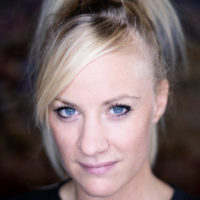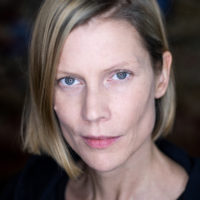Distinguished
Reporting
Award
All she wanted was a photo of the new-born babies and asked that István and Tamás love the twins
When we began this story, I was still having treatment to get pregnant by artificial insemination. It can be a deeply depressing process to go through: you think, what happens if this doesn’t succeed? Would I be capable of, say, adopting? Would I be able to love a child who might have had a terribly tough background, arriving with a “package” that I would have to deal with. The straight answer, I think, is that even now I couldn’t do it, even after seeing close-up what a chance the twins received when they were adopted by István and Tamás.
I began documenting the life of the family with my colleague Orsi Ajpek because we thought it was important that people become better informed about rainbow families like this one. As a family, they may be unusual, but they live the same kind of ordinary, everyday life that any heterosexual family lives. It’s just that in Hungary the circumstances have radically changed in the past few months. There have been a series of legal changes that have made adoption by single parents and same-sex couples all but impossible, followed by the “paedophile law” that explicitly incited hatred towards gay people.
About a year ago we talked to István and Tamás about how absurd it was that the 40-hour course to prepare would-be adoptive parents was no longer mandatory. Now we are talking about whether the time might come where the family packs its bags and finds another more welcoming country in which to bring up their children.
In Hungary, it is unusual for a rainbow family to put their lives in the public eye. István and Tamás don’t want to become a visible target and are protective of their privacy. They have their own everyday struggles as adoptive parents. Nevertheless, they decided to show themselves so that those who attack gays and rainbow families out of ignorance can see how they live. Perhaps through this article people can understand that “these children are not suffering in chains and their parents don’t spend the whole year frolicking around in pink thongs in preparation for Pride, but in fact live ordinary lives”. Another factor was a wish to help young people who think that their lives are at an end because they are not heterosexual. They want to set an example for them and give those people hope. If reading their story changes the opinion of just one parent and encourages them to support their homosexual child, then the publicity has been worth it, the two fathers say.

We arrive in the residential district of a small town in Pest County and for the umpteenth time park in front of their house. The twins are tottering in the doorway waiting for us, but there has been some drama and it is hard to say which of them has bigger tears rolling down their face.
“It has been one of those days,” says István with an air of resignation. The magic of our arrival quickly loses its effect and the two children continue crying in unison while demanding to be picked up and allowed on to their dads’ knees. But lunch needs to be prepared. It’s mushroom and paprika stew and between stirring István gives hugs to first one and then the other, and sometimes to both at once, to calm them down. He doesn’t despair — it’s the most natural thing in the world for him to be the father of two children. For as long as he can remember he has wanted this with Tamás.

For seven years, starting in 2012, they actively tried to become parents. They had been living in the Scottish city of Glasgow for two years. They got married in 2016 and wanted to settle down there, but in the end they came back to Hungary. One reason was that they hadn’t been able to adopt there. They wanted to have children so badly, and initially even contemplated going down the illegal route. No time or money was spared in exploring every possibility, including methods that we outsiders can only guess at.
They described the surreal world constructed around those who will give anything to become a parent. A huge amount of money changes hands and there is a real battle for potential surrogate mothers. They were in discussions with Portuguese, Ukrainian, British and Hungarian surrogate mothers but had also considered the Czech Republic, Congo and South Africa. The Ukrainian surrogate mother would, for a larger amount of money, have used her own eggs to have their children. One Hungarian woman offered to do it for 5 million forints (€14,000) but they didn’t go through with it. They say that at first it seemed like the easier option to pay to become a parent, but it isn’t. “What do you say to the child about how much you paid for them? The price of a small flat?” They felt that that none of these ways would work.

They finally decided that the official adoption route was the only acceptable way to go, which in Britain is a far longer and more complicated process than in Hungary. For six months they had to have monthly meetings with the social services. “We had to write essays, we had compulsory reading, we were interviewed separately and together, they asked for references from friends and employers” — they list the hoops they had to go through.
It was all going smoothly until Brexit completely jammed the process. In spite of the strict procedures they had followed they did not get approval for adoption. The problem wasn’t that they were two men, but that everything changed after Brexit.
“The biggest concern was that we would take the child away from its roots. It was very hard to explain to them that we hadn’t come from a Communist country.”
In the end their application was rejected because they were young and were studying alongside their work, so were not considered ready to be adoptive parents.
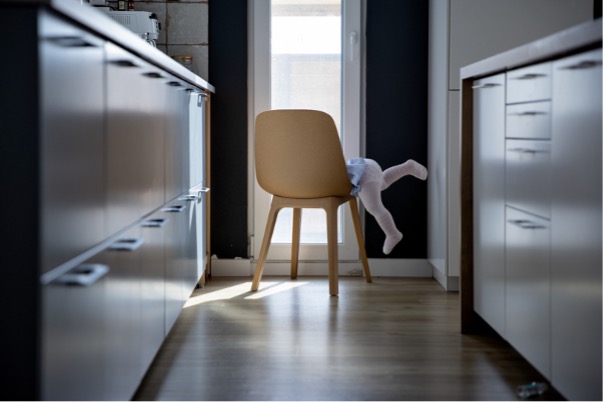
They had already decided to go back to Hungary if they didn’t get approval in Scotland. They moved back in 2017, but still had not given up hope of becoming parents. In Hungary it wasn’t possible even then to adopt as a same-sex couple, but a single person (ie, not married) living with a registered partner could adopt, regardless of their sexual orientation. They agreed that István should make the application. This was a conscious choice, as was the decision before they got married that they should take each other’s name, so that any children they did have would bear both their names.
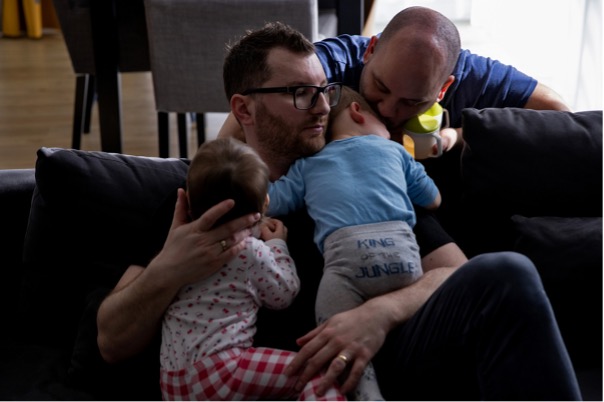
In early 2018 they applied to the Regional Child Protection Service (Tegyesz), which came to inspect their home and their circumstances. The couple went through the compulsory psychological assessments and completed the preparatory adoption course that was then mandatory.
The psychologist working with István said they generally recommended that a single would-be adoptive parent take on a child of the same sex, but István and Tamás asked for that not to be the case.
“We gave our reasons why we could also bring up a daughter. We said we understood the importance of a female model for a child’s all-round healthy upbringing, but we said this did not necessarily have to be the mother, and there would be grandparents, aunts and cousins around the child who would fill that role.”
Their arguments were accepted and at the end of 2018 they were given approval for adopting “a 0-4 year old child or twins” with no restrictions regarding their sex or background.
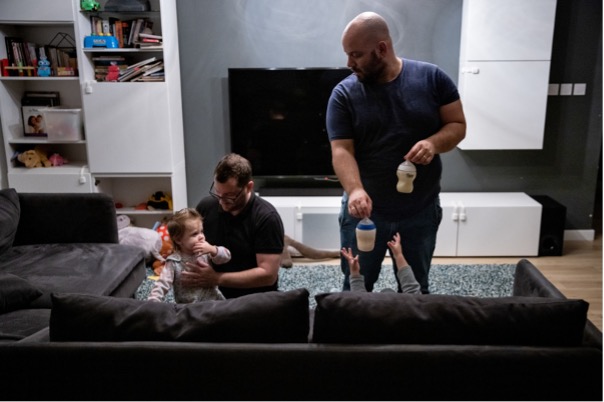
It was compulsory from 2003 onwards for would-be adopters to take part in a preparatory course. This 20-hour course was extended to 40 hours in 2018. This gave more time to cover important subjects such as connecting with children, the question of the child’s background, adopting older or disabled children and the handling of loss, according to Zsófia Kiss, a specialist psychologist. She runs courses for the Ágacska Foundation, which specialises in adoption. Alongside her birth daughter she has an adopted son, and often draws on her own experiences so that she can more convincingly prepare couples for adoption.
The aim of the course is to prepare the adopters so that as little as possible takes them by surprise. They cover the areas that are defined by genetics which adopters certainly cannot change. For example, genetically defined characteristics include the colour of their skin and eyes, their temperament, skills, capabilities and inherited diseases.
“However, the child’s behaviour and values are defined by its environment. There is no such thing as a stealing gene or a lying gene. Empathy can be taught,” Kiss says.
István and Tamás often came across these stereotypes when they intentionally prepared their friends and family members for the fact that there was a good chance that “Gypsy children would be running round the house”. This caused some serious debate when some acquaintances joked that they would have to hide their wallets away. But the couple also heard people say that if they adopted Roma children, “sooner or later their blood would show through”.
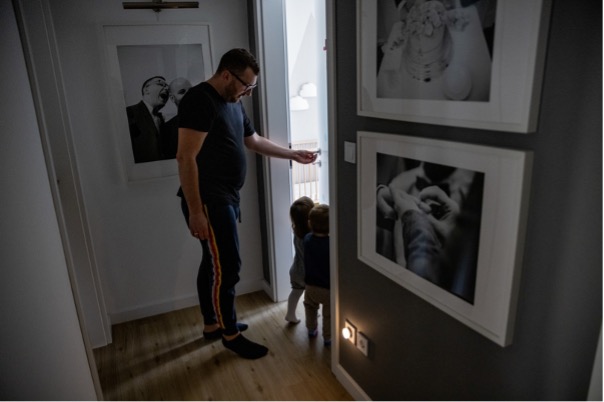
The majority of adopted children are born from unwanted pregnancies and have not received proper care in the womb. “The mother may have been starving or undernourished; she may have smoked, drunk or taken drugs — but it should be noted that generally it is not the mother’s fault that she finds herself in this position,” says Kiss. All such behaviour affects the embryo’s nervous system. An underdeveloped nervous system can be a factor in the neurological and psychiatric states such as ADHD, concentration problems and delayed speech development, which cannot be cured but can be handled. Adopters need to be prepared for this.
“We don’t want to shock them but we tell them everything that could arise, which of course doesn’t mean that it will,” the psychologist explains.
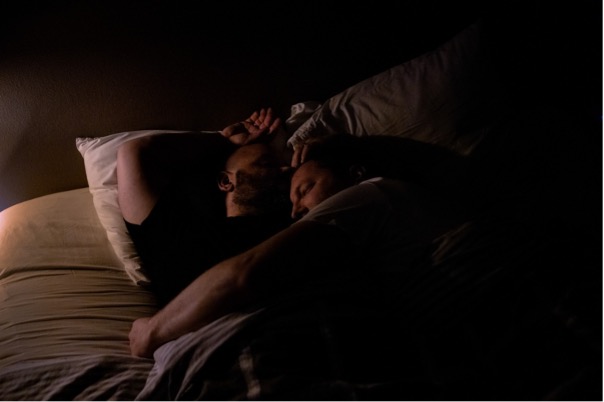
Adoption is often preceded by loss. Typically, adopters have not themselves been able to have biological children, and at this point the great majority resort to medical help. When that also proves unsuccessful the would-be adopter is already burdened with a considerable sense of loss. This loss has to be processed, Kiss says, because the adopted child has its own losses which also have to be handled.
“If I am not well myself, it will be harder to help others. If I am still feeling that it is a blow of fate that I couldn’t have biological children, and if I go into adoption with the sense that “If I can’t have a horse, I’ll make do with a donkey,” that is a huge trap. The child will grow up in the shadow of this idealised biological child that I am still clinging to,” Kiss says.
It is not only heterosexual couples that have to struggle with loss. István and Tamás had to abandon their hopes of having a biological child because of the legal system in Hungary. “If we had gone in for adoption in a different country, we might have been able to go through surrogacy. But even if we had got round Hungarian laws and had decided to live in a mosaic family, having children with a lesbian couple, we still did not want to be ‘weekend fathers’,” they say.
They also had to accept that their adopted children won’t bear any of their own features, but they say that they can see their gestures and habits in the children. “Our daughter sleeps in the same way as Tamás, and like him hates labels in her clothes,” they say.
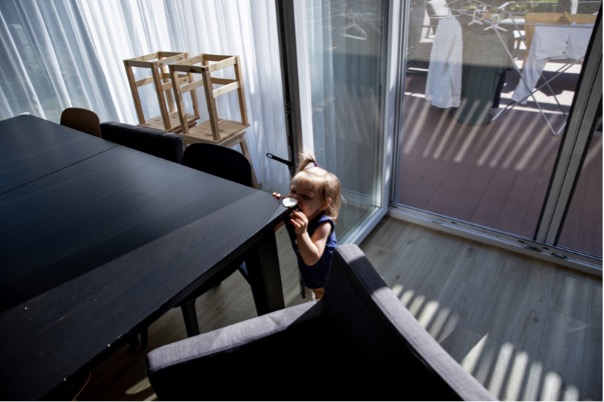
The government modified the legislation on adoption last year. In theory this aimed to simplify and speed up the process, so that more children could find families quicker. Children in the child protection system can be adopted after three months instead of six months if their birth parents take no interest in them. The 40-hour preparatory course that had been mandatory was made optional and free, a move that aroused strong protest.
“To be frank, we wouldn’t have gone on the course if it hadn’t been compulsory. We thought that we knew it all,” Tamás says. However, they acknowledge that they learnt skills on the course that helped them through the harder moments. For them the course was the most useful and most important part of the adoption process, “because a 3-year-old can’t hear that they have been rejected. One can involuntarily think or even actually say such things,” István says. “One of our very kind friends asked — in tears, with the best intentions: ‘How can people reject them?’ I explained that these children have not been rejected, they have been looked after. The child who has been rejected is the one found on a lakeside shore in a plastic bag.”
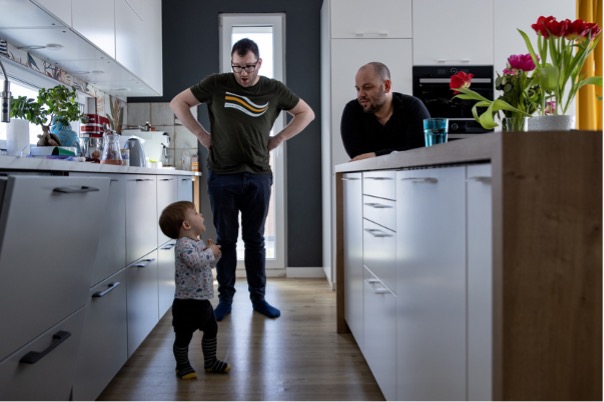
However, making the course optional is not the main problem, say the dads. Now basically only married couples have a chance of adoption — the decision over whether unmarried people (or same-sex couples) can adopt “in cases deserving of particular merit” lies in the hands of one single person, the minister of family affairs. In the modified legislation, children that are up for adoption must first be offered to married couples in the same county. If that doesn’t succeed, the search is widened to include married couples elsewhere in the country. If that is also unsuccessful, then the search is opened up to single people, first at a county level and finally at a national level. The children that are available for adoption at that final stage are those that were turned down by heterosexual couples. If the minister decides that a child should not be given to a single adopter, the case can spin out and the child can get stuck in the system. So effectively adoption has become harder for the very people who were typically the most likely to undertake the upbringing of older or more problematic children and those with a more troubled background.
‘Those who are most welcoming are the ones in this system who for the bloody life of them won’t be given children. And that is not fair. Why is a single parent worth less than a heterosexual married couple?” István and Tamás ask.
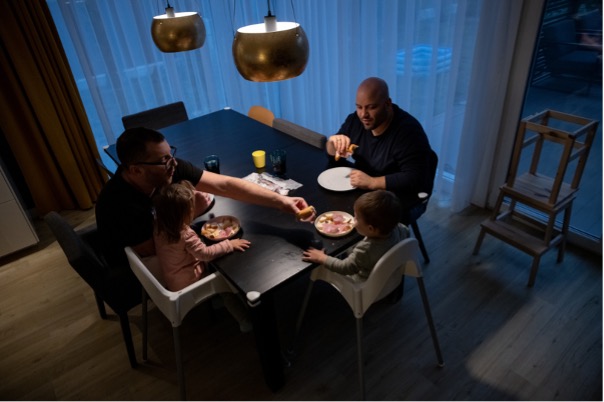
Once the couple received their approval, they didn’t even dare go on holiday, they were so anxiously awaiting the phone call. On the advice of friends they signed up with an adoption agency. Such agencies operate on certain conditions. In Hungary there are two agencies that deal with single parent adopters — in exchange for an annual membership and a commission.
In September 2019 the head of the agency finally rang them to say a woman had chosen their profile. After the second call it turned out that it was opposite-sex twins.
“They told us the woman was 32 weeks pregnant and was about to give birth. We were given their background, their little ‘package’, and told to decide,” István says about the second phone call. He says it was not an utterly difficult “package” but there were “some things in it”. No one other than the couple themselves knows exactly what it contained, and they have deliberately not told anyone, even their closest friends. “Our story begins with the phone ringing. What happened before that is the babies’ story, which we will tell them one day. It is up to them if they want to talk about it then,” Tamás says.
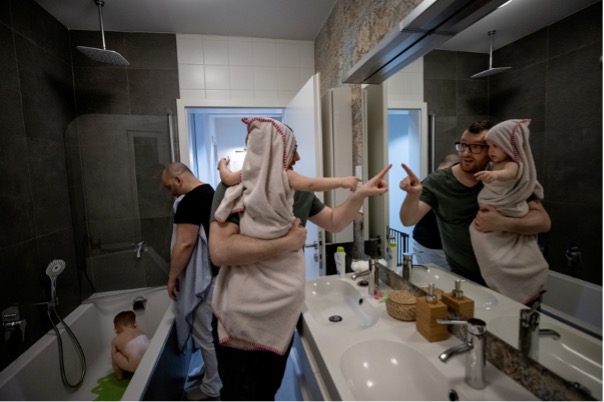
Since it was an open adoption process, István and Tamás met the twins’ biological mother. They say a meeting like that is both incredibly depressing and uplifting, and it was the agency boss who got them through the more awkward moments.
“Even after the children are born you are full of doubts. You are afraid the mother will have second thoughts, while she is afraid you won’t like her children and will change your mind.” They both describe her as an attractive and kind woman. They have a positive image of her, which they say will make it much easier to talk about her with the twins later.
“We don’t want to embellish the story but we can give a positive image of her. That is how we have to discuss the whole thing, because these children, like any adopted children when they reach a certain age — whatever you do — feel rejected. These children weren’t rejected, because their biological mother worked hard to make sure they would be all right. She took care of them.” By getting in touch with the agency, she gave them a chance. She asked that they should go to a house with a garden, to a family without other children, and she explicitly said she wanted a gay couple to adopt them. The agency also offered her heterosexual couples, but István and Tamás were the first that she met.
“We reassured her that if she chose us, we could promise her that we would give our lives for these babies and we would do everything we could to make sure they have a good life.”
István and Tamás particularly wanted her to choose the children’s names. When they had their first meeting, it turned out that she had already chosen names. It was one of the most touching moments when she said the two names, because suddenly it gave a personality to the two children. After that meeting, the mother did not want to meet any other couples.
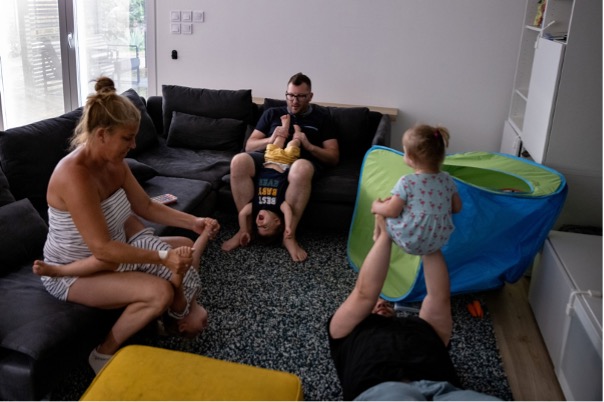
The twins were born in the 35th week, at the end of November 2019. “After we saw the babies, the head of the agency asked us again if we intended to go ahead with the adoption.” István and Tamás of course burst into tears and for the hundredth time said yes. The agency sorted out all the official paperwork and registered the children with the local authority, where the mother had to officially declare that she was giving up the children and entrusting them to István and Tamás.
“This was a very agonising situation. The official explained to her that she could still change her mind, and would have six weeks to do so,” István says, looking back.
When the dads said goodbye to the mother, they asked if she would like to keep in touch with them. She didn’t. She said she found this all very painful. All she wanted was a photo of the new-born babies and asked that István and Tamás love the twins.
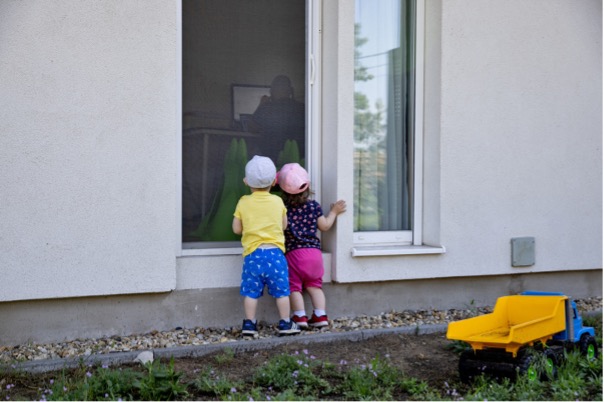
The six-week period after a temporary placement ruling allows both sides the chance to change their minds. The head of the agency told the couple they should only get in touch if there was a problem.
In practice they didn’t have time to count the days. After one week the boy was admitted to hospital. He wasn’t eating much and was crying at such a pitch that they knew something wasn’t right. The hospital’s first reaction was that “the gay dads are overreacting to a trapped fart. The baby has colic.” But the inflammation indicators were so high that the doctors suspected meningitis. They were allowed home after a week, but it was never clear what had caused the inflammation. The couple say that it never occurred to them to pull out of the adoption. That time in hospital just confirmed that they really were a family.
The critical six weeks ended in early January 2020, and the mother did not change her mind. “Those last few hours were very difficult. I sat looking at the clock, wishing the time to pass, wishing it to be midnight. At midnight we went into the children’s room and told them that they were staying with us. It felt so good,” says István.
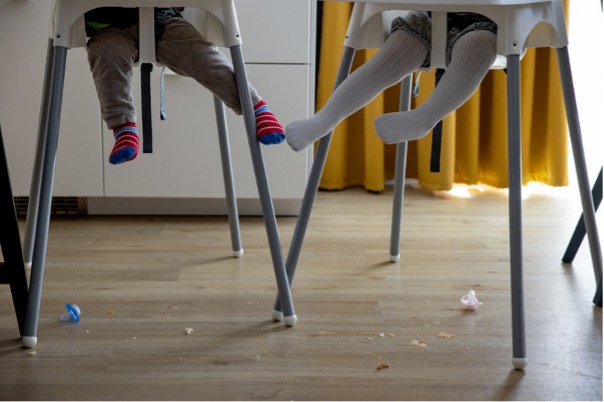
The dads wanted the children to have a definite female presence in their lives and to this end choose two godmothers who would be a part of their everyday lives. However, until they went to kindergarten the twins spent most of their time with István, while Tamás went to work. István spent more time with the twins, staying awake with them at night if they were ill, or reading up about weaning, and this awoke a sense of fatherhood earlier in him. For Tamás, the week-long stay in hospital with his son was an important turning point. Even though it did not bring a sense of fatherhood, it did awaken a sense of responsibility. “From then on it was totally clear that this child needed protection. We bonded that week, during those long nights,” says Tamás.
For both men, becoming a father has been a long process. “There comes the time when you are important, when only you can calm a child, when the child will only accept things from you. Those are the moments when you begin to feel that you are a parent, a father.”
The dads say that they have no traditional roles in the house. “We are equals, there is no division of roles. We each do the tasks we are better at or prefer doing. I am a much better cook, for example, but Tamás is better at cutting hair.” So István became Daddy while Tamás is Dad. It was one of the defining moments when the children identified them using those two words.
They have a lot less time for each other and their lives have changed: the focus is on the children, who they bring up with amazing humour but with consistency. It is such an idyllic environment that Orsi and I have noticed that we visit them to recharge our batteries.
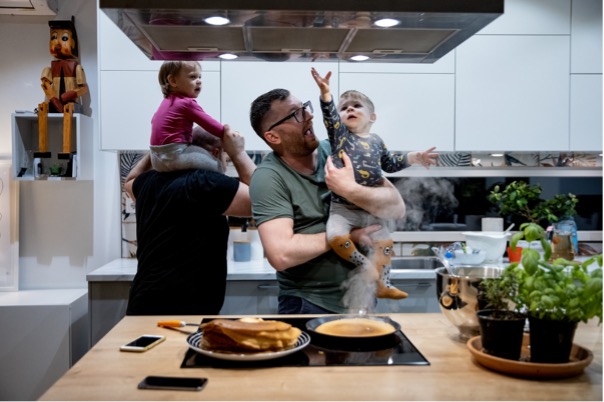
The two men have the kind of solid bond that it is rare to see in a relationship. They generally uphold traditional values in their parenting — they are pretty strict when it comes to eating, sleeping and watching television. Even so, there are times when we are run ragged, getting up at night or both kids screaming at once, even though of course it is the children who made the family complete.
“The first couple of weeks were very easy. They woke up every four hours, had some food and went back to sleep — and we wondered, is this it? Then suddenly they began crying and staying awake for longer and longer,” they recall. István and Tamás went through the same low points and doubts as any first-time parents.
“For eight years we had been trying to have children, we had done all we could, and then these two miracles arrived. But when you are up every night for three weeks you do ask yourself — and the fact that the question arises makes you feel bad — whether you are doing it right, whether this is what you want. And then you turn the corner. We were sitting there in the third week and I was rocking the little boy. I told him to give me a sign there is some point to all this, and he broke into a little smile,” says István.
Of course it hasn’t got much easier since then. The baby boy reacted much more strongly to stimuli, he was more sensitive and everything was more of a drama compared to his sister. He needed special exercises to develop his movement, but he has caught up completely. Now there is real competition as to who can dive more quickly onto the sofa, or who will pull the other round the kitchen island on the toy truck. So their lives are pretty much like that of any other family of twins. With one difference. Right from the start the dads have told the children that they are adopted.
“You instil an awareness of that— it’s not like that one day you sit them down and you tell them. You have to make the children aware that this is not a taboo subject, that this is something they can talk about.”
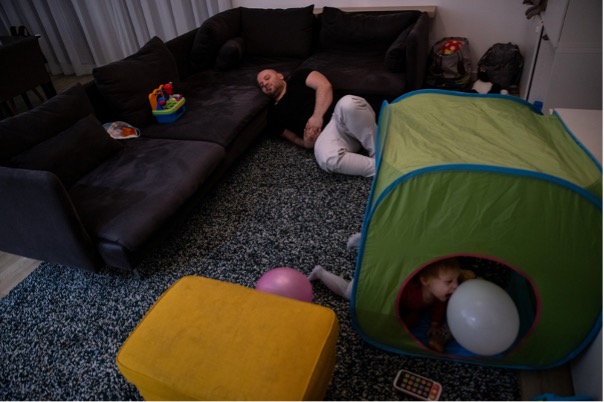
Zsófia Kiss says they recommend that parents find some form of positive expression for this. For example, “It’s so good we adopted you, as that makes the family complete.” What you might say will vary as the children get older. “By the time they go to nursery, they should be clear that they were from another woman’s tummy and were then adopted. As they develop, they will ask more questions about what happened and why they were adopted,” says the psychologist.
You won’t be able to get away without the child asking if their biological mother was a sex worker or was raped. “They could hear this from someone else, and the secrecy can drive a wedge between parent and child. You might need to call in a specialist at this point, since the story of their biological family is an integral part of their whole self-image. “You don’t have to embellish it, you just have to relate to the child’s biological roots acceptingly.”
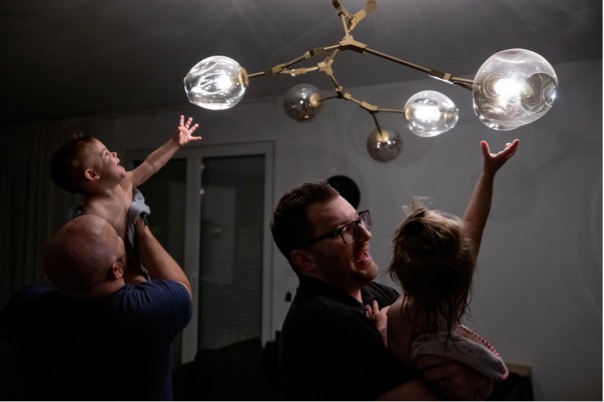
Also, it cannot be a taboo subject for the kids that István and Tamás are gay. “For them it will be natural that two people love each other, regardless of their gender,” says István. From the start the dads have smuggled in tolerance, acceptance and different family combinations into the twins’ lives. On the bookshelves, alongside traditional Hungarian children’s stories are books such as And Tango makes three, about two male penguins who create a family together.
István and Tamás say that ever since they were kids at nursery they were both more interested in boys than girls, but for many years they suppressed these feelings, mainly to live up to social expectations. Tamás says he did not want to stand out. He buried himself in his studies, tried to look “more manly” and to have dates with girls. István was having his own struggles. “I thought this was terrible, I so loved my mother and sister and felt they didn’t deserve such a bad family member.” He knew he had to keep it secret. He was constantly struggling with this and felt totally alone. He planned that he would have a wife and children but would lead a parallel life. As a teenager he did wonder if he should just end it all and then he wouldn’t hurt anyone.
However both of them came to the decision that they could not live like this. It helped that both of them could go to gay bars that had opened, where they discovered there were others like them. They also found more information on the internet. For István, the turning point was when a gay guy asked him: “You do know that you too have a right to happiness, don’t you?”

They say that it still isn’t easy talking about that period, not least because they don’t want to reopen old wounds. They know that it was just as hard for their parents to process the fact that their sons were attracted to men as it was for them. “We were smashing their dreams of a wedding and having grandchildren. It makes a parent blame themselves. Why didn’t I notice? What did I do wrong? Of course, the answer is nothing.”
István came out to his parents when he was 21. Tamás was 24 when he met István at a party in 2008. “It was love at first sight, the way we connected that evening,” he says. They started dating and then moved in together, but Tamás only introduced István to his mother and brother after they had been together for a year. He had never told them before that he preferred men. It took a while for the family to accept the situation and tell others.
István’s position is more complicated, as some of his family are less accepting. Until he was 30 he played along with this, and never spoke in front of his relatives about being attracted to men, though clearly everyone knew. It was just easier for one and all to keep quiet about it. For a while he brought Tamás to family lunches, but in the end it was just too awkward. He has completely lost touch with some of his relatives because of his relationship, but there are others who have become much closer since the arrival of the twins. The one person who they were most afraid would not be able to handle the children’s arrival was István’s grandmother. But she has been one of the most welcoming in the family, and was perhaps even more excited about them than the dads.
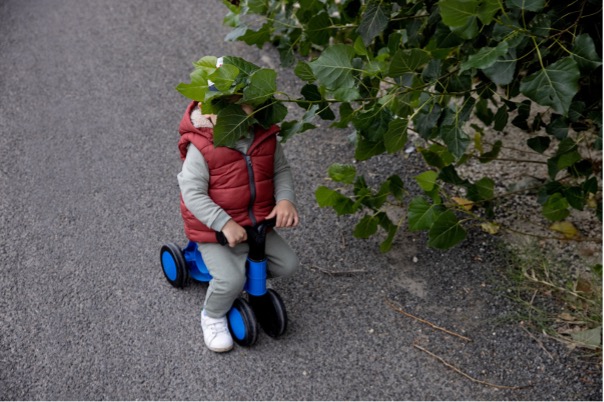
The couple do not usually get involved in political affairs, and they don’t like to mix family relations with politics, but the subject of the government’s policies come up increasingly often. They had never really paid attention to which party people voted for, and politics was never discussed at gatherings of family or friends. However, the anti-gay legislation has changed that. It particularly worries them as they are now a same-sex couple bringing up two children. “I’m concerned about the safety of my children. I didn’t care when it was just me being abused or spat at in the street, but now they might do it to my children,” says Tamás.
It would be painful now to find out that someone close to them has voted for the government. “That decision would effectively legitimate this whole madness — it would effectively be a vote against my family,” he says. They admit that if the government passes more legislation that makes their family’s life impossible, they might have little choice but to leave.
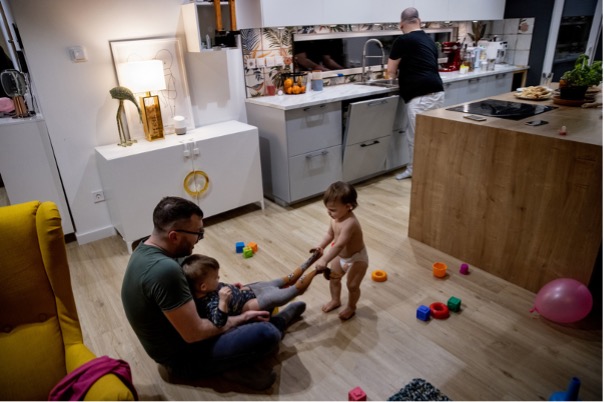
They feel that there is active incitement against gays in Hungary, although in their immediate environment they have not met much resistance. So far no one has created difficulties for them because they adopted as a same-sex couple. Their strategy is to take it as given that they are a rainbow family. They undertake the battles so that it does not make things harder for their children.
“We went into the kindergarten and told them that we are one family with two dads. We will do the same at the nursery and later at school.”
The health visitor “didn’t bat an eyelid” when Istvan told her the children did not have a mother, and in the kindergarten, where the children began at the end of October, the staff didn’t make any comments — on the contrary. The head didn’t cause a problem when it came to filling out the parts of the forms referring to the children’s mother.
The dads want to bring up the children so that they know how to defend themselves. “If they are self-confident and take it as natural that they have two dads — and what’s more feel good about being in this family — when anyone tries to make fun of them it won’t faze them.”
“We want to teach them to be tolerant, to understand that if someone hurts them, it’s not necessarily because that person is malicious — he or she might be just ill-informed. They need to learn to communicate with and educate those around them,” says Tamás.
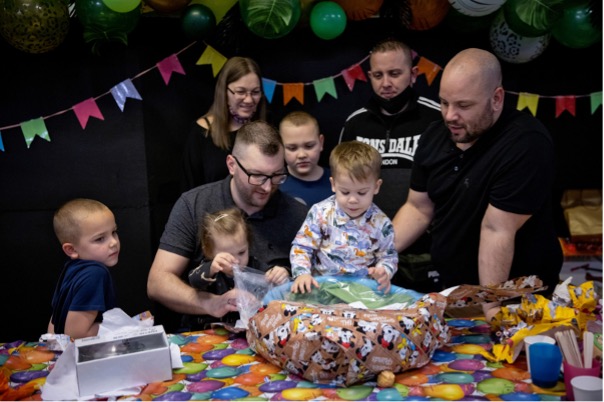
The dads were preparing for the twins’ second birthday for months, with a separate Facebook page, a present list, a three-tiered cake and enough balloons for a wedding. They wanted the perfect party as the pandemic prevented them from celebrating the children’s first birthday the way they wanted to. It all happened just the way they wanted, a big party with family, friends and lots of happy children. “As a parent it is very important — and it’s a very good feeling too — if lots of people like your children. And lots of people like ours.”






